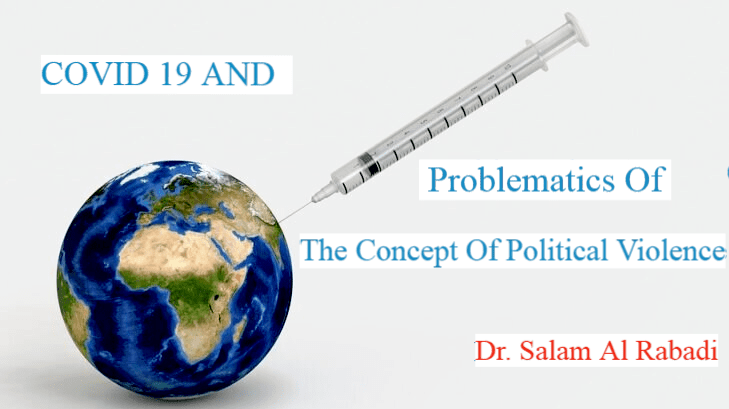“Covid 19” And Problematics Of The Concept Of Political Violence
October 22, 2020
0
comments
852
Views
Add to reader
Print
In
Log in if you are already registered

Dr. Salam Al Rabdi \ Author And Researcher In International Relations
Violence is one of the means used in politics, regardless of its legitimacy and its philosophical ethics, and also away from the dialectics of social contract theory or human nature that revolve around the human instinct and the struggle for survival. Based on this, it can be said that the rationale of the relationship between violence and politics raise many problematics, as from an analytical point of view there is a difficulty in the possibility of a precise and clear separation between violence and politics, and it happens due to the cultural and ideological background by which an action or behavior can be judged as falling In the category of political violence or vice versa.
For example, political violence related to resistance to occupation according to certain culture may be a legitimate and legal act, and in return the same act may be according to another culture an illegal act, that falls under the category of terrorist practices. It is worth mentioning in this context the difficulty of defining and enumerating political, economic, cultural and even legal issues and actions that can be described as political violence. For example, to the present day there is no global agreement on a comprehensive and clear definition of political violence related to terrorism, and the same applies to the definition of the crime of aggression issued by the General Assembly of the United Nations, which still carries with it many interpretations and diligences.
In this context related to the problematic of the concept of political violence, many question marks can be raised, which revolve around:
1- How to classify the economic sanctions imposed by some countries or issued by the UN Security Council: Are they violent and inhumane political acts and means? Or are they a legitimate political sovereign action?
2- How to classify the media policies that encourage and incite violence. Do these policies fall under the category of incitement to political violence and support for terrorism? Or do these policies fall under the category of freedom of expression?
3- How difficult it is to classify political violence in terms of its source, whether it is emanating from states, individuals or non-governmental organizations, not to mention the difficulty of separating each of them?
4- How to classify corruption as one of the most dangerous forms of political violence based on modern concepts used in approaching corruption problematics?
5- How to classify violence related to comprehensive human security, such as environmental, health, technological, and biological violence..etc?
According to this group of question marks, it seems that there is an urgent need to clarify the idea that political violence is not only conditional on the association with physical violence or concrete violence, there may be more severe and influential economic and cultural violence at of all political levels. In addition, what complicates matters on a philosophical and realistic level is that most political theories that base their analysis on the assumption that the state as a political institution (which possesses the legitimacy of violence within and outside its borders) is the main actor on the world stage, has been categorically overridden with the increasing influence of Individuals, NGOs, transnational corporations ..etc. Also, the criteria of power itself have changed and are no longer measured only by the extent of the ability to use legitimate violence represented by political power, and are no longer confined to the traditional form associated ith classic economic power or conventional military power.
Consequently, and based on the development in the nature of contemporary human issues, work must be taken to create a new critical political vision for everything related to the criteria for how to understand political violence in all its forms. In this regard, we are obliged as a result of the ethical dilemmas associated with many issues (such as issues of climate change and the environment, and everything related to the biotechnology revolution and gene manipulation, as well as the implications of artificial intelligence.etc) to reconsider many concepts, especially with the presence of new terms related to contemporary political violence, such as environmental violence, technological violence, biological violence, algorithmic bias violence and health violence..etc.
Perhaps one of the brightest evidences for the importance of finding a new critical view of the concept of political violence are those accelerating developments at the level of global health security resulting from the repercussions of the spread of the Covid-19 pandemic, was accompanied by many violent and unusual manifestations in global politics that are related to health issues, such as exchanging accusations about the causes of the pandemic or wars of masks and medical devices ... etc., which confirm the extent of the new changes in the concept and standards of political violence.
In light of the foregoing, we can say that, despite the existence of many initiatives that try to develop a logical critical vision on how to approach the concept of political violence, but unfortunately it is traditional, and it is characterized by its inability to create a new intellectual framework capable of understanding the emerging phenomena and practices, which are related to the philosophy of political violence. As well as it is ignoring to a large extent most of the aforementioned problematics and dialectics, as it seems to be still centered around a classic vision of the era of modernity, that already has been surpassed it .
We are currently in the era of Postmodernism, Post-truth and Post-humanism which has dropped all axioms and postulates, that it is era of the methodology of skepticism and atomization that we need, despite all the problematic controversies in that methodology.
Share this article
OTHER RECORDS




